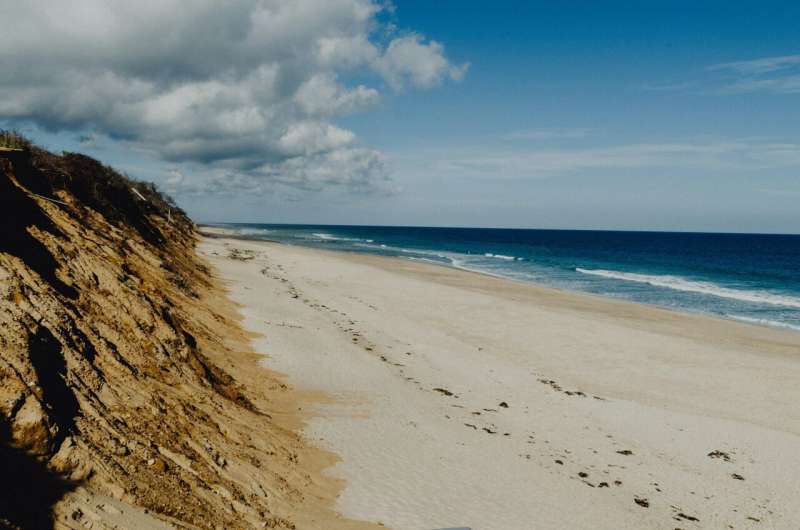This article has been reviewed according to Science X's editorial process and policies. Editors have highlighted the following attributes while ensuring the content's credibility:
fact-checked
reputable news agency
proofread
Cape Cod scientists want to dump 60,000+ gallons of sodium hydroxide into ocean in climate change experiment

Environmentalists and fishermen are pushing back against a plan from a group of scientists who want to dump more than 60,000 gallons of sodium hydroxide, more commonly known as lye, into the ocean off Cape Cod to gain an understanding of how to slow climate change.
Scientists from Woods Hole Oceanographic Institute in Falmouth are seeking a federal permit for their project, which would start sometime this summer with a field trial program that would disperse roughly 6,600 gallons 10 miles south of Martha's Vineyard.
Woods Hole says there are two central goals to its so-called LOC-NESS project, short for "Locking away Ocean Carbon in the Northeast Shelf and Slope."
The first is to "understand potential environmental impacts of using ocean alkalinity enhancement to remove carbon dioxide from the atmosphere." The other is to "verify and report the amount of carbon dioxide this method might realistically remove if deployed at scale."
"While emission reductions are key to minimizing human impact on Earth's climate, it has become clear in recent years that drastic emission reductions must be supplemented by efforts to actively remove existing carbon dioxide from the atmosphere," Woods Hole scientists wrote in their application to the Environmental Protection Agency.
Environmentalists and fishermen are not taking kindly to the proposed experiment which would continue next summer at a more drastic scale of roughly 60,000 gallons in the waters northeast of Provincetown, in the Gulf of Maine.
Friends of the Earth is one of the dozens of groups that wrote to the EPA against the project during a public comment period that closed Friday.
They highlighted how ocean alkalinity enhancement—a process that adds alkaline substances to seawater to change the ph and enhance the ocean's natural carbon sink—is "under moratoria under the United Nations Convention on Biological Diversity due to the risks and uncertainties that these technologies entail to biodiversity and ecosystems."
"Sodium hydroxide is an incredibly dangerous substance," Friends of the Earth senior campaigner Benjamin Day told the Herald. "It causes chemical burns if it touches your skin or marine animals. We think dumping tens of thousands gallons of that into the ocean is a bad idea."
Proposals typically seen for alkalinity enhancement use minerals, like limestone, that create a "different set of problems," Day said. Sodium hydroxide presents more immediate issues, he added.
Woods Hole scientists say the project will "operate within a pH range considered safe for aquatic life (and) maintain strict environmental monitoring protocols."
Scientists will then constantly monitor the alkalinity patch, "using a suite of instruments, sensors, and sampling equipment."
"The results of these monitoring efforts will provide some of the first in-water measurements of the safety of OAE," scientists have said, "including its impacts on water chemistry, the marine food web, and larger organisms such as copepods."
Alison Brizius, director of the Massachusetts Office of Coastal Zone Management, says she believes the project is much needed to understand the effectiveness of marine carbon dioxide removal.
"This study has the potential to inform future work as mCDR research continues and possible commercial-scale applications are developed," she wrote in a letter to the EPA on Friday.
Fishermen across the region are afraid of how the experiment could affect their operations.
Robert Scammon, a commercial groundfish captain who has fished the Gulf of Maine and George's Bank for 37 years, said the targeted area for testing has produced 30 to 40% of his catch in that time.
Jerry Leeman, CEO and founder of the New England Fishermen's Stewardship Association, added he believes the "project is being done in haste, and without proper oversight."
"Major impacts to the commercial and recreational fisheries are likely, which would cause severe economic turmoil (and loss of commercial and recreation opportunities) to the neighboring states' fisheries, in addition to the immediate test site," he wrote in a letter.
2024 MediaNews Group, Inc. Distributed by Tribune Content Agency, LLC.



















